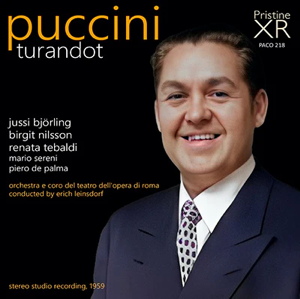
Giacomo Puccini (1858–1924)
Turandot (1926)
La principessa Turandot – Birgit Nilsson (soprano)
II principe ignoto (Calaf) – Jussi Björling (tenor)
Liu – Renata Tebaldi (soprano)
Orchestra e Coro del Teatro dell’opera di Roma/Erich Leinsdorf
rec. July 3-4 & 6-11 July 1959, Teatro dell’Opera di Roma, Italy
Libretto & score available online as download
Reviewed as 24-bit FLAC download
Stereo XR Remastering
Pristine Audio PACO 218 [2 CDs: 115]
Ah! Turandot, mighty Turandot… I have often pondered on which composers I would like to have been granted longer life, so that more works could have been composed or completed – what a sombre list: Mozart, Schubert, Bruckner, Mahler, Puccini, Ravel, Butterworth and so on. Whenever I listen to Turandot, I really do feel a sense of loss – if only Puccini had been able to find that melody to end the opera – as he wrote on the score “Non ho trovato la mia grande melodia”.
Leinsdorf’s RCA recording of Turandot should have been wonderful in all respects, not just vocally (just? My goodness, could such a cast be assembled today?). RCA had been producing technically superb recordings for most of the 1950s and some of them are still very highly regarded even today; those by Munch in Boston and Reiner in Chicago, for example.
For Turandot, though, they moved to Rome, where the Rome Opera Orchestra, which was not regarded as approaching the virtuosity of the great American orchestras, was entrusted to realise the score under the guidance of Leinsdorf, a noted orchestral disciplinarian. At the time, he conducted the Met orchestra in the German repertoire.
A good stereo separation was achieved and I am inclined to say that the orchestral playing was fine. But it is also true that unfortunately the technical quality of the stereo recording was not up to the standard of RCA’s earlier efforts. It is rather dry in acoustic and inclined to constrict at higher volumes, without the lovely expansive bloom that so distinguished the Boston and Chicago issues. Presumably this was put down to the acoustic of the Rome Opera House. In addition, some of the brass playing is extremely close-up, for example, during the riddle scene, a solo trumpet repeatedly blasts out, to dramatic but wearing effect.
The recording itself became famous because it won the 1960 Grammy Award for Best Opera and Leinsdorf also picked up the prize for the best Concerto recording; the Brahms 2 with Richter.
With these awards under its belt, RCA have reissued the recording on SACD, although it is now hard to find it at a reasonable price, even second-hand.
To the rescue comes Pristine Audio, who have waved their technological wand over the recording. When I compare it against my RCA CD, I find that the sound has an added warmth that mitigates the harshness of the original. The coarse edge to the brass sound has been reduced, although the above-mentioned trumpet still blasts out.
I have always been irritated by Leinsdorf’s heavy hand at the great choral conclusion to Act 1, where Calaf has responded negatively to his companion’s pleas to avoid seeking out Turandot. The thing should be resplendent in a magnificent choral surge, but Leinsdorf imposes rhythmic brakes on everyone in the seconds after Calaf strikes the gong. Just listen to Karajan’s DG recording (a recording which has received a fair number of critical put-downs), or the famous Decca recording under Mehta, to hear how an adrenalin boost can be applied to thrilling effect.
As for the singers, there is not much that can be said when one considers the multiple reviews that have appeared. But I for one, much prefer Barbara Hendricks’ true lyric soprano voice as Liu in Karajan’s DG recording – she sounds much more girlish, sexy even, than Tebaldi, although it is impossible to criticise Tebaldi’s lovely floated high pianissimos.
Bjorling was dead of a heart attack, aged just 49, some 12 months or so after this recording, but he is in splendid voice here, and Nessun Dorma is beautifully phrased. He manages to make his rejection of Liu towards the end of Act 1 sound gentle and caring.
And now to the eponymous Turandot. Nilsson at her stupendous peak. Such secure high notes, sung with fire and lightning, that knocks you back in your seat.
I still don’t think that I can say that she had a beautiful voice – immense power, solid as a rock, yes, but I have compared her to Katia Ricciarelli under Karajan. Here, her sweet-toned singing in the quieter sections put Nilsson in the shade. But of course, Karajan’s eccentric, misguided casting of her for a role that repeatedly requires sheer power to penetrate through the orchestra, ultimately backfires. She struggles to sing with a penetrating power that was not within the natural range of her lyric soprano voice.
Of course, it would not have been within the power of Pristine Audio to change or to want to change the distinctive sound of the individual voices. The edge or distortion afforded to them at times in the original issue has, however, been reduced.
To summarise, this is a valuable release of, at times, a remarkable recording.
Jim Westhead
Previous review: Ralph Moore (October 2024)
Availability: Pristine ClassicalOther cast
Ping – Mario Sereni (baritone)
Pang – Piero De Palma (tenor)
Pong – Tommaso Frascati (tenor)
Timur – Giorgio Tozzi (bass)
L’imperatore Altoum – Alessio De Paolis (tenor)
Un mandarino – Leonardo Monreale (bass)
II principino di Persia – Adelio Zaganara (tenor)


















